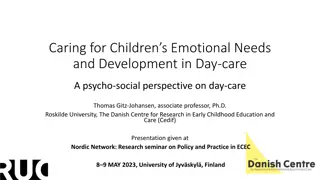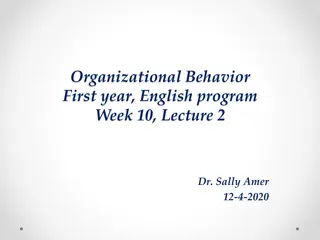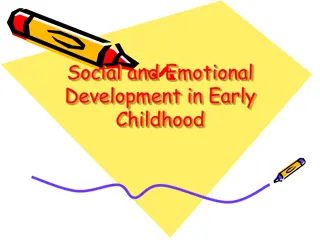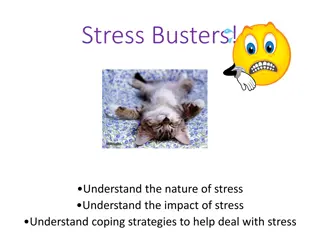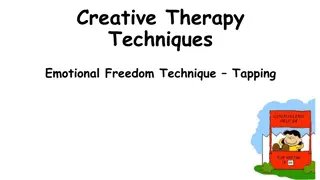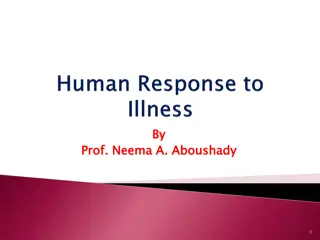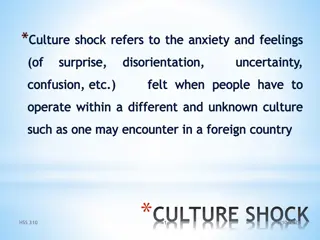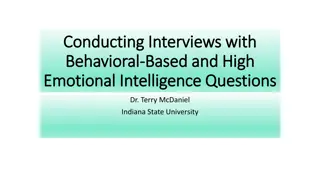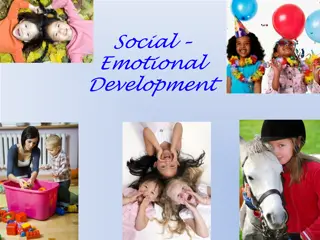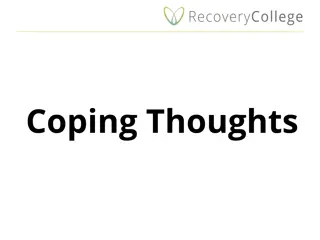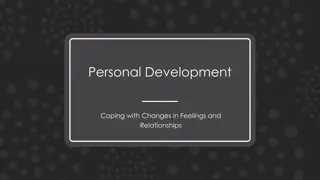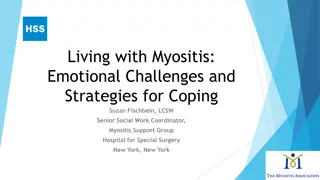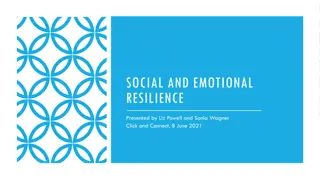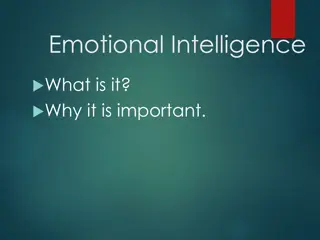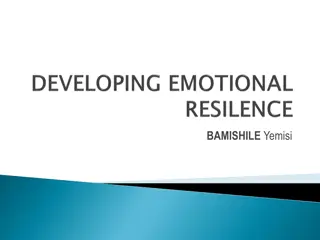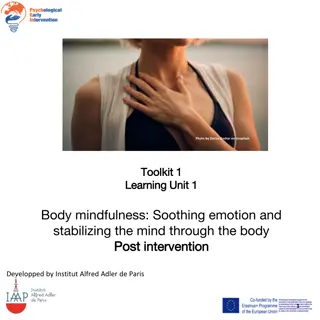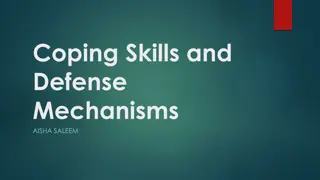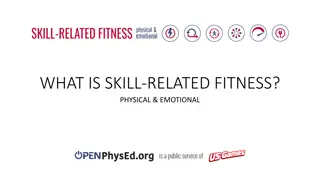Understanding Emotional Patterns in Families
Families play a crucial role in shaping individuals' emotional responses and behaviors. Caregivers influence how we perceive and manage emotions, impacting our emotional well-being. By examining how different emotions are accepted, rejected, and modeled within families, one can gain insights into th
10 views • 14 slides
Understanding Children's Emotional Development in Daycare from a Psycho-Social Perspective
Scientific evidence emphasizes the early onset of emotional development and its profound impact on lifelong outcomes. The quality of childcare processes plays a pivotal role in shaping children's social-emotional development, highlighting the importance of nurturing emotional relationships in daycar
0 views • 10 slides
Understanding Emotional Labor in Organizational Behavior
Emotional labor involves employees expressing organizationally desired emotions during work interactions, impacting job performance. Employees may face emotional dissonance when projecting one emotion while feeling another, leading to surface or deep acting. Affective Events Theory (AET) suggests th
0 views • 19 slides
Understanding Emotional Wellness for Inner Well-Being
Exploring the importance of emotional wellness in cultivating inner well-being, this content delves into the facets of social, mental, and emotional well-being. It emphasizes the significance of acknowledging and accepting our feelings, maintaining a positive outlook, and finding purpose and peace w
1 views • 27 slides
Early Childhood Social and Emotional Development Insights
Social and emotional development in early childhood is influenced by various factors such as family dynamics, parenting styles, peer interactions, and cultural backgrounds. Erikson's stages highlight the importance of initiatives and self-understanding in shaping emotional growth. Parents play a cru
2 views • 35 slides
Understanding Emotional Intelligence in the Workplace
Explore the significance of emotional intelligence in the workplace, its definition, five competencies, case studies, and strategies to enhance skills. Dive into scenarios, role-plays, misconceptions, and why emotional intelligence is crucial for professional success. Learn about managing emotions,
0 views • 33 slides
Understanding Stress and Coping Strategies
Understanding the nature and impact of stress is crucial in managing it effectively. Stress is a common experience with various physiological, physical, psychological, and behavioral effects. Coping strategies are essential to deal with stressors such as anxiety, overdrive, and constant stress facto
0 views • 17 slides
Understanding Emotional Intelligence: Key Principles and Skills
Emotional intelligence, as presented by David Taylor, is crucial in perceiving, understanding, and managing emotions in oneself and others. It plays a vital role in professional and personal relationships by enhancing emotional awareness, recognition, and management. The principles of emotional inte
1 views • 22 slides
Understanding the Impact of Cortisol on Emotional Expression in Young Children Facing Economic Hardship
This study explores how the stress hormone cortisol is related to emotional expression in young children experiencing economic hardship. Cortisol levels can indicate stress, but prolonged exposure to stress can lead to desensitization. The research focuses on children attending Head Start preschools
0 views • 15 slides
Understanding Emotional Abuse: Signs, Effects, and How to Respond
Explore the intricacies of emotional abuse through the eyes of Dr. Katia Reinert, Associate Director of GCHM. Delve into the techniques used by emotional abusers, self-assessment for identifying abuse, effects of abuse, and guidance on how the Christian community can help. Discover the challenges of
1 views • 31 slides
Understanding Emotional Freedom Technique (EFT) Tapping for Emotional Wellness
Emotional Freedom Technique (EFT) tapping, rooted in acupressure, offers a holistic approach to addressing stress, fear, and phobias. This body-centered therapy draws on ancient Chinese practices, stimulating specific acupoints to improve energy flow. Studies show effectiveness in treating depressio
0 views • 4 slides
Nursing Strategies for Emotional Reactions to Illness
In this content, the focus is on understanding the stages of illness and the crucial role of nurses at each stage. It also highlights the patient's emotional needs during illness and the importance of maintaining a positive self-image. Nursing strategies for assisting patients in coping with anxiety
0 views • 8 slides
Emotional Awareness and Coping Strategies for Classroom Interactions
Explore class agreements promoting respectful behavior, delve into emotions quiz about recognizing and managing feelings, and analyze real-life scenarios to understand sadness, rejection, and loss coping mechanisms.
0 views • 22 slides
Understanding Culture Shock: Phases, Symptoms, and Coping Strategies
Culture shock is the anxiety and disorientation experienced when adapting to a new and unfamiliar culture. This phenomenon involves various stages, from the honeymoon phase to readjustment and reverse culture shock. Symptoms of culture shock can be physiologically, psychologically, and socially base
1 views • 11 slides
Enhancing Emotional Intelligence Through Behavioral Interview Questions
Explore the key aspects of emotional intelligence, including social-emotional competencies and cognitive, affective, and behavioral competencies. Learn how to conduct interviews focused on emotional intelligence and discover the importance of relationships, self-awareness, responsible decision-makin
0 views • 44 slides
Understanding Social and Emotional Development in Young Children
Explore the general emotional patterns and specific emotions in young children aged 4 to 6 years. Understand the positive and negative characteristics such as self-centeredness, independence, anxiety, and fear, and learn how to deal with common fears like imaginary dangers and separation anxiety. Re
1 views • 19 slides
Understanding Maternal Avoidant Coping and Medication Adherence in Pediatric Organ Transplant Candidates
Maternal avoidant coping styles may impact medication adherence in pediatric organ transplantation candidates. Challenges in the field include organ shortage, patient non-adherence, and identifying health risk factors for effective organ allocation. Parents' coping behavior factors of stress include
0 views • 14 slides
Safeguarding Infants from Emotional Maltreatment: What Works?
Safeguarding infants from emotional maltreatment is crucial during the first two years of life. Emotional abuse, though not always accompanied by physical or sexual abuse, can have severe impacts on a child's development. The paper explores the structure, prevalence, and impact of emotional abuse on
3 views • 59 slides
Coping Behavior Variances in Adolescents with Varying Degrees of Internet Addiction
Adolescence is a critical period for personal development where coping behavior plays a significant role. This study by Irina Petrochenko focuses on exploring coping behavior features in adolescents with different levels of internet addiction. Research methods involved testing 75 individuals aged 14
0 views • 10 slides
Intergenerational Trauma: Coping Strategies of Elderly African American Survivors of Jim Crow
Exploring coping strategies passed down by survivors of Jim Crow to the next generation, this qualitative research project conducted interviews with nearly 100 elderly African American survivors. Key findings reveal the long-term psychological impact of racially traumatic events and diverse coping m
0 views • 27 slides
Understanding Loss and Grief: Coping Strategies and Emotional Healing
Delve into the complexities of grief, exploring its nature, triggers, and emotional impact. Discover coping mechanisms and the importance of seeking professional support when needed. Recognize the various stages and styles of grieving, empowering yourself to navigate through the healing process with
0 views • 17 slides
Enhancing Coping Skills through Positive Thinking
Explore the power of positive thinking in coping with challenges and improving mental well-being. Learn how to prune negative thoughts, develop positive coping statements, and maintain a healthy positivity-to-negativity ratio for a resilient mindset. Enhance your coping abilities by harnessing the c
0 views • 12 slides
Understanding and Coping with Changing Feelings and Relationships
Explore a comprehensive PowerPoint presentation focusing on personal development, coping with changes in feelings and relationships. Engage with various activities and discussions to recognize, communicate, and cope with different emotions while understanding the impact of adolescence on feelings. E
0 views • 26 slides
Understanding Emotional Intelligence and its Components
Emotional Intelligence is about identifying, understanding, and managing emotions, recognizing your own needs and those of others, and enhancing interpersonal skills. It involves self-perception, self-expression, and affects decision-making and stress management. People with high emotional intellige
0 views • 20 slides
Coping with Emotional Challenges of Living with Myositis
Factors contributing to depression in myositis patients include physical limitations, insecurity in medical care, and impact on relationships and education/career. Strategies for coping include self-advocacy, communication, adapting to changes, and promoting kindness and compassion towards oneself a
0 views • 14 slides
Effective Coping Strategies for Stress Management
Avoidance coping is described as a maladaptive way of dealing with stress by avoiding the source of discomfort. In contrast, active coping involves addressing stressors directly through cognitive or behavioral strategies. Avoidance coping can lead to increased stress and conflict in relationships, w
0 views • 11 slides
Understanding Adolescent Development and Emotional Intelligence by Finbar Chambers
This collection presents insights on Gardner's Multiple Intelligences, Emotional Intelligence, and the importance of understanding adolescent development. Finbar Chambers explores emotional makeup, behavior management strategies, and the transition to independence during adolescence. Discover the im
0 views • 20 slides
Understanding Emotional Labour in Probation Practice
Explore the concept of emotional labour in probation practice, highlighting the management of emotions, impact on research and practice, links to burnout, and the role of managerialism and rationality. Delve into emotional work, Chamberlayne's 'emotion work', and feeling rules associated with emotio
0 views • 16 slides
Building Social and Emotional Resilience: Key Strategies and Practices
Explore the importance of social and emotional resilience presented by Liz Powell and Sonia Wagner. Learn about fostering resilience, promoting healthy risk-taking, and effective parenting practices. Discover how to support resilience after trauma and navigate fears during pandemic times. Gain insig
0 views • 11 slides
Importance of Emotional Intelligence in Religious Leadership
Religious leaders benefit greatly from high emotional intelligence, leading to better performance, increased staff retention, and a more positive work environment. Emotional intelligence plays a vital role in pastoral ministry, enhancing emotional care for congregants. Educational programs focusing
0 views • 15 slides
Understanding Emotional Intelligence in the Workplace
Emotional intelligence plays a crucial role in professional success, impacting how we lead teams, handle pressure, and build relationships. This webinar explores the definition of emotional intelligence, its significance in the workplace, and practical ways to enhance it. Discover the key elements o
0 views • 14 slides
Understanding Emotional Intelligence: Definition, Importance, and Examples
Emotional intelligence, a term that originated in the 1960s, refers to the ability to recognize and manage emotions in oneself and others effectively. It involves identifying emotions, understanding their impact, and using this awareness to guide behavior. Emotional intelligence is crucial for perso
0 views • 35 slides
Enhancing Emotional Resilience: Key Strategies and Benefits
Exploring the concept of emotional resilience, this content covers the definition of emotions, emotional resilience, and the domains of resilience. It delves into the importance of emotional resilience, ways to improve it, and how it helps individuals bounce back from adversity, maintain balance, an
0 views • 17 slides
Toolkit for Emotional and Mental Well-being Through Body Mindfulness
This toolkit offers a comprehensive approach to emotional and mental well-being by focusing on body mindfulness techniques. It includes activities and quizzes for victim status awareness, body stabilization, emotional stabilization, cognitive stabilization, and social stabilization. Through practice
0 views • 8 slides
Understanding Emotional Intelligence in Positive Leadership Sessions
Emotional intelligence plays a crucial role in building a positive workplace environment. Defined as the capacity to recognize, understand, and manage emotions effectively, it helps in fostering strong relationships, enhancing team dynamics, and boosting overall work performance. Emotional intellige
0 views • 26 slides
Coping with Ataxia: Strategies and Support for Living Well
Charlotte DePew shares her personal journey with Friedreich's ataxia, offering insights into coping mechanisms, emotional stages, and practical tips for managing the progressive condition. From grieving to finding feel-good activities, this comprehensive guide empowers individuals to navigate life w
0 views • 12 slides
Understanding Coping Skills and Defense Mechanisms
Coping mechanisms and defense mechanisms are strategies individuals use to manage stress and emotions. Coping mechanisms help people adjust to difficult events while maintaining emotional well-being, whereas defense mechanisms operate at an unconscious level and can change internal psychological sta
0 views • 18 slides
Social-Emotional Health and Resilience of Teachers in East European Countries
This study explores the social-emotional health and resilience of teachers in Latvia, Lithuania, and the Slovak Republic as part of an Erasmus+ project aimed at developing a digital support system to promote their well-being. The interplay between mental health, social-emotional health, and resilien
0 views • 30 slides
Supporting Your Child in Coping with Stress and Anxiety
Understand how stress and anxiety affect children, learn about common stressors and coping strategies, recognize alarming behaviors, and discover effective ways as a parent to help your child navigate through difficult emotions. By being attentive, empathetic, and supportive, you can guide your chil
0 views • 13 slides
Understanding Skill-Related Fitness: Physical and Emotional Aspects
Skill-related fitness encompasses both physical and emotional components, such as agility, balance, coordination, power, reaction time, and speed. Physical agility involves quick body movements, while emotional agility relates to positive responses in various situations. Physical balance requires we
0 views • 7 slides

